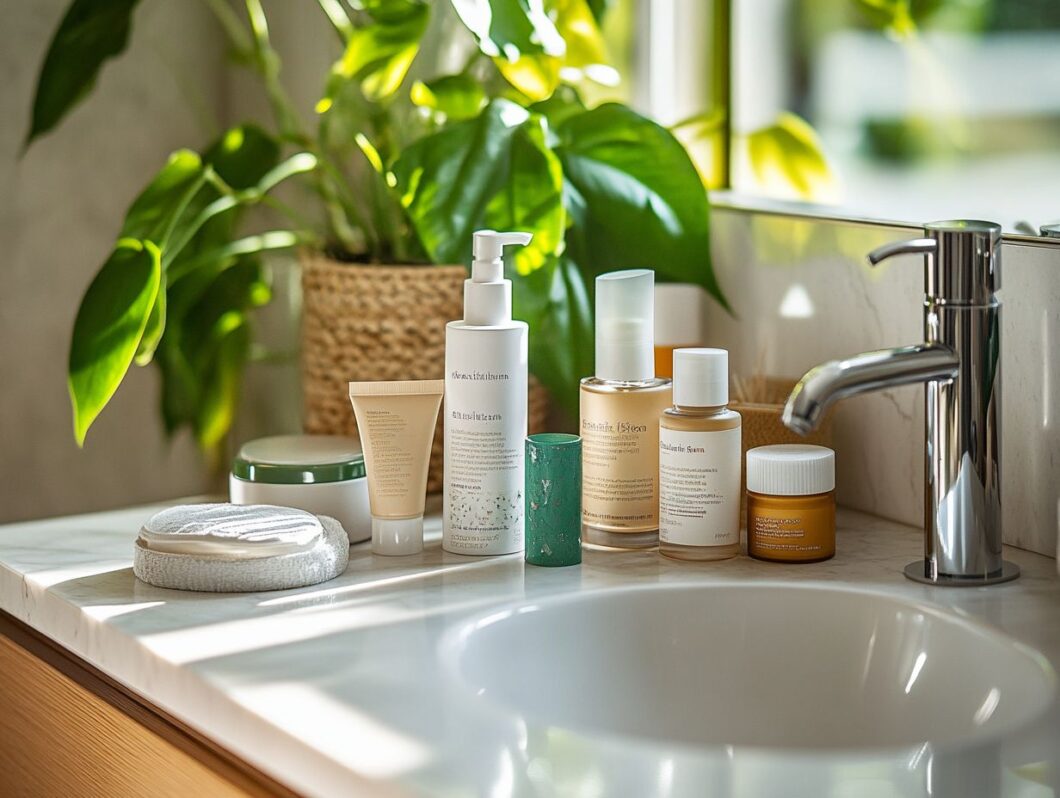When it comes to achieving healthy, radiant skin, I find that the advice of dermatologists can be invaluable. This article outlines ten essential skincare tips that professionals rely on to help individuals understand and care for their unique skin types. From developing a consistent skincare routine to recognizing the importance of sun protection and hydration, each tip is tailored to empower me in my skincare journey.
I am learning to listen to my skin and make informed choices that promote lasting beauty.
Key Takeaways:
Why Trust Dermatologists?
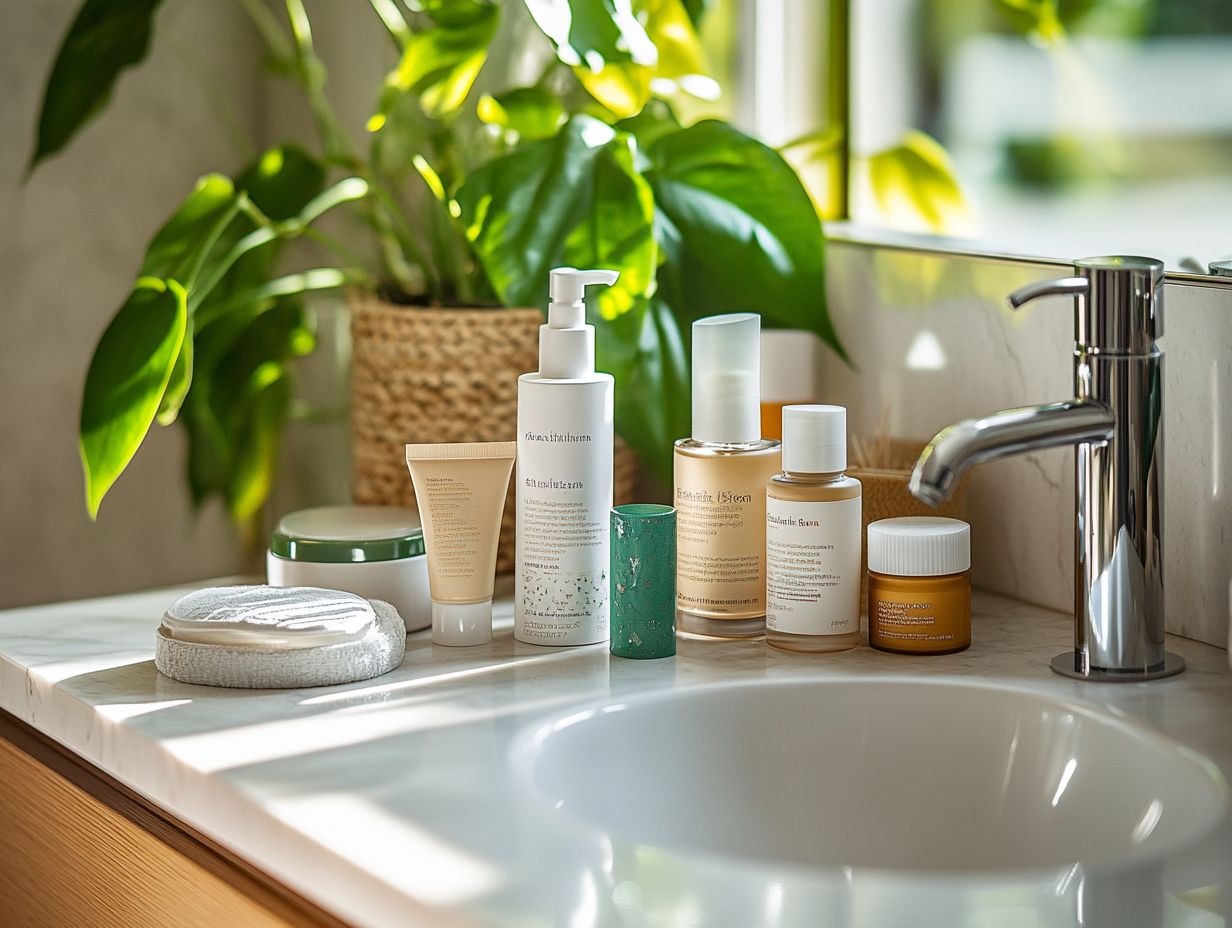
Trusting dermatologists for skin care is essential due to their extensive medical training and expertise in diagnosing skin conditions, assessing skin health, and formulating personalized treatment plans.
Experts from reputable institutions like the Cleveland Clinic and the American Cancer Society emphasize that dermatologists are qualified to recommend suitable skin care products, including sunscreens, moisturizers, and topical creams. These products are crucial for preventing skin cancer and addressing various skin conditions. They provide tailored advice that helps patients navigate complex issues such as acne treatment, skin sensitivity, and anti-aging routines.
With a comprehensive understanding of the diverse range of skin types—oily, dry, combination, and sensitive—dermatologists offer exceptional guidance on maintaining optimal skin health. They can identify common conditions such as eczema, psoriasis, and rosacea, and recommend evidence-based strategies to enhance the skin’s resilience and appearance.
The importance of professional guidance cannot be overstated; self-diagnosing or relying solely on over-the-counter remedies may not effectively address underlying issues. By collaborating with dermatologists, individuals can create personalized skincare routines that target specific concerns while promoting long-term skin wellness and vitality. For more insights, check out these 10 skincare tips dermatologists swear by.
Tip #1: Know Your Skin Type
Understanding my skin type is essential for establishing a personalized skincare routine that effectively addresses my unique needs and concerns.
Each skin type—whether oily, dry, combination, or sensitive—has specific characteristics that necessitate tailored approaches to maintain skin health and hydration.
Identifying Different Skin Types
“`html
Identifying different skin types requires careful observation of key characteristics such as oil production, sensitivity, and hydration levels, which can reveal underlying skin conditions or the overall state of the skin barrier. For instance, oily skin may present with enlarged oil glands, resulting in shine and acne, while dry skin often feels tight and rough due to a lack of hydration. For more insights on skincare, check out these 10 skincare tips dermatologists swear by.
“`
To effectively assess my skin type, I recommend conducting a simple self-exam. This involves washing the face with a gentle cleanser, patting it dry, and then waiting an hour before making any observations.
During this time, I take note of how my skin feels, paying attention to areas of dryness, oiliness, and any sensations of tightness or irritation. It’s important to avoid common mistakes, such as confusing dry skin with dehydrated skin, as this can lead to improper product choices and potentially exacerbate issues like flakiness or excess oil.
Gentle cleansing is crucial for maintaining the skin’s natural balance, enabling it to function optimally and reducing the risk of conditions such as eczema or acne flare-ups.
Tip #2: Develop a Consistent Skincare Routine
I believe that establishing a consistent skincare routine is essential for achieving and maintaining healthy skin. This approach allows me to effectively address specific concerns such as hydration, skin aging, and the prevention of various skin conditions.
A well-structured routine generally involves cleansing, moisturizing, and sun protection, and I find it important to adapt this regimen to suit my individual skin type and specific concerns.
Essential Steps for a Skincare Routine
An effective skincare routine comprises several essential steps, including gentle cleansing, exfoliating, applying topical antioxidants, and ensuring adequate hydration. Each of these steps is strategically designed to improve skin health and enhance the skin barrier function, allowing for better absorption of skincare ingredients.
For the cleansing step, I prefer using a mild cleanser that effectively removes impurities without stripping the skin of its natural oils, thus maintaining a healthy moisture balance.
Next, I incorporate gentle exfoliation to encourage the removal of dead skin cells, revealing a brighter complexion underneath. This step also enhances product penetration, making subsequent skincare applications more effective.
Incorporating topical antioxidants such as Vitamin C is crucial in my routine, as they provide protection against free radicals, brighten the skin tone, and promote collagen production.
The importance of moisturizing cannot be overstated. I find that using techniques like gently patting a hydrating cream rather than rubbing it in helps lock in moisture and promotes a dewy finish, ensuring that my skin remains plump and resilient throughout the day.
Tip #3: Use Sun Protection
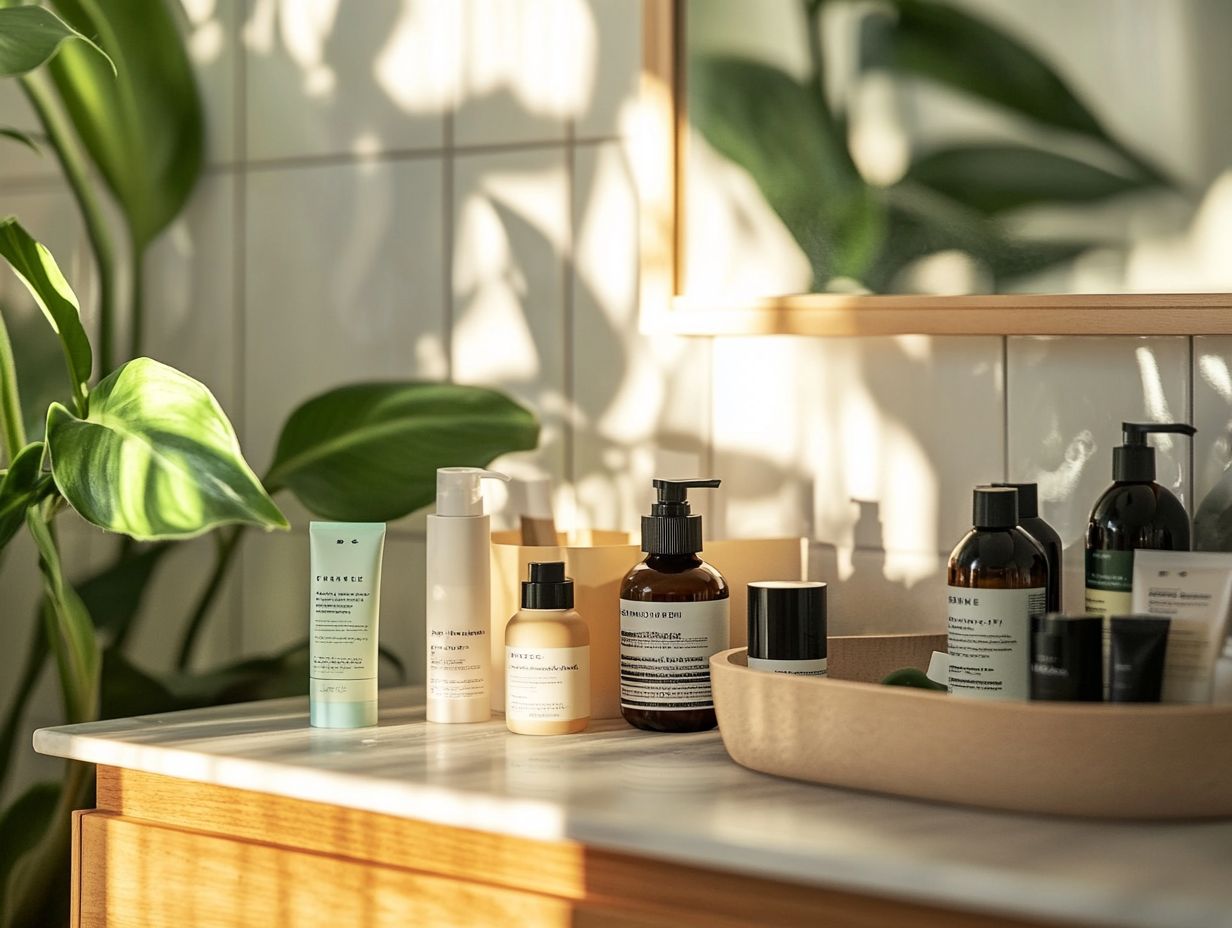
I recognize the importance of using sun protection to safeguard my skin from harmful UV rays, which can contribute to skin cancer and accelerate the aging process.
Dermatologists recommend the daily application of sunscreen—whether physical or chemical—tailored to my skin type and personal preferences.
The Importance of Sunscreen
I recognize that the importance of sunscreen cannot be overstated; it serves as my first line of defense against skin cancer and premature aging. Recommendations from dermatologists consistently highlight the necessity of applying broad-spectrum sunscreen to protect against both UVA and UVB rays.
Neglecting adequate sun protection increases my risk of developing skin cancer, as well as the visible signs of aging, such as wrinkles, fine lines, and sunspots. I understand that it is crucial to select a sunscreen with an SPF of at least 30 and to opt for products labeled as water-resistant, especially when engaging in outdoor activities.
When applying sunscreen, I ensure that I use a generous amount—approximately one ounce for full-body coverage—and spread it evenly across all exposed skin. I also make it a point to reapply every two hours or immediately after swimming or sweating, as this is essential for maintaining effective protection.
By adhering to this routine, I promote long-term skin health and combat the harmful effects of sun exposure.
Tip #4: Exfoliate Regularly
I recognize that regular exfoliation is essential for maintaining skin health. It effectively removes dead skin cells and debris, promoting a healthier and more radiant complexion.
Additionally, I find that exfoliating enhances the effectiveness of other products, allowing for improved absorption of moisturizers and treatments.
Benefits of Exfoliation
The benefits of exfoliation go well beyond achieving a clearer complexion; it also stimulates blood flow and lymphatic drainage, which can significantly enhance skin health and rejuvenation. I find that regular exfoliation improves skin texture, elasticity, and overall vitality.
By effectively removing dead skin cells and promoting cell turnover, this practice addresses a variety of skin concerns, including acne, uneven skin tone, and even fine lines and wrinkles.
However, it is crucial to recognize that while exfoliating is vital for attaining a youthful glow, moderation is essential. Over-exfoliation can strip the skin of its natural oils, leading to increased sensitivity and a compromised barrier.
Therefore, I believe it is important to find the right frequency and method tailored to individual skin types. This approach ensures that I maintain the delicate balance necessary for keeping my skin healthy and radiant.
Tip #5: Hydrate Your Skin
I recognize that hydrating my skin is essential for maintaining its overall health. Proper hydration helps to balance moisture levels and supports skin elasticity, contributing to a more youthful appearance.
By incorporating hydrating ingredients such as hyaluronic acid and essential oils into my moisturizing routine, I can significantly enhance the hydration of my skin.
Importance of Hydration for Healthy Skin
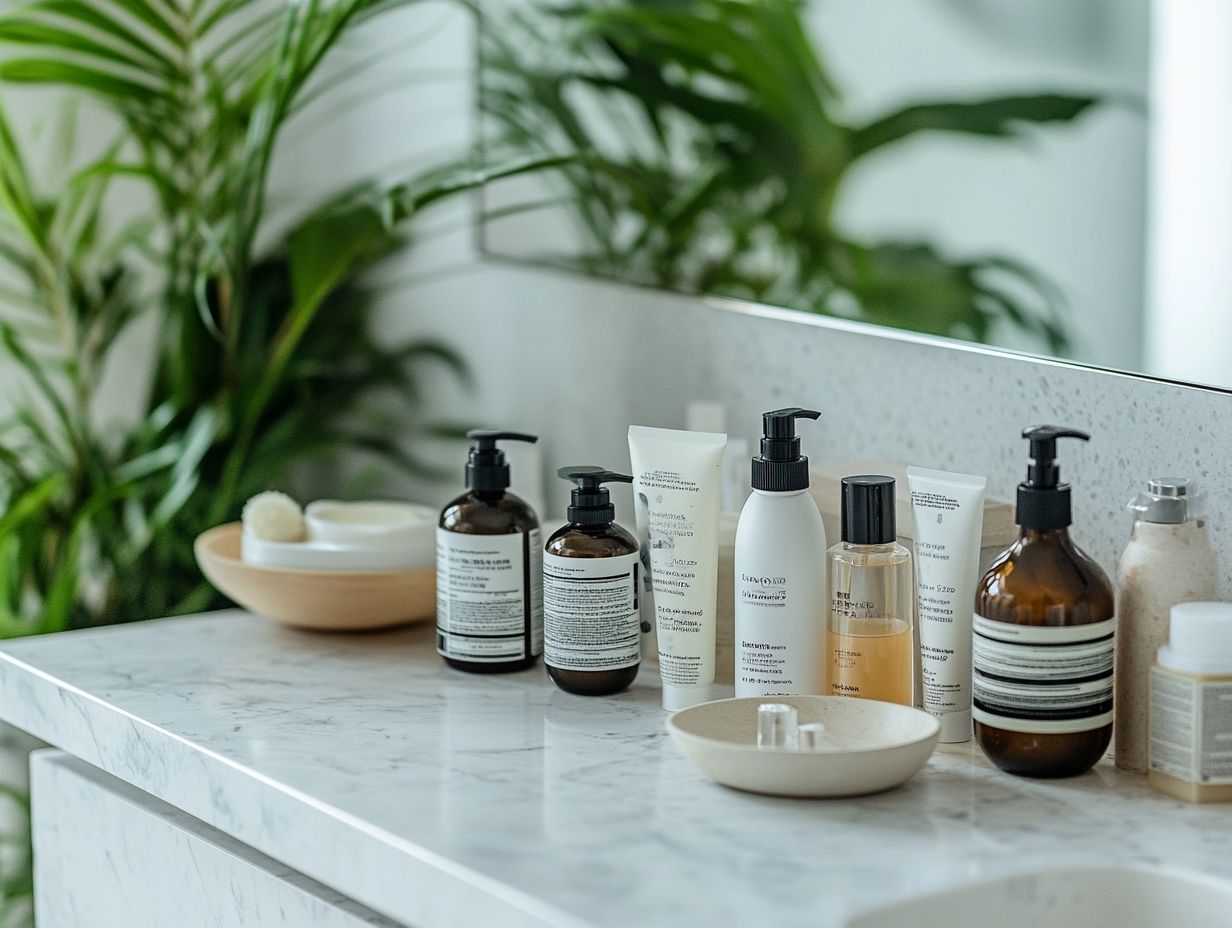
I understand the critical role hydration plays in maintaining healthy skin, as adequate moisture levels are essential for preventing dryness, irritation, and the visible signs of aging. I find that incorporating hydration techniques, such as chamomile and rosemary baths, can significantly enhance my skin health.
I prioritize using high-quality moisturizers that are enriched with hyaluronic acid and glycerin, which effectively improve my skin’s ability to retain moisture. By applying these products regularly, I create a protective barrier that not only locks in hydration but also minimizes the risk of developing common skin issues such as eczema and psoriasis.
Maintaining a consistent hydration routine has revitalized my skin, resulting in a more luminous complexion and strengthening its defense against environmental stressors. By being mindful of both internal and external hydration, I can foster optimal skin health, ensuring that every effort contributes to achieving a radiant and resilient appearance.
Tip #6: Incorporate Antioxidants into Your Routine
Incorporating antioxidants into my skincare routine is essential for combating free radicals and preventing oxidative stress, both of which can accelerate skin aging and compromise skin health.
I have found that topical antioxidants, such as Vitamin C, are particularly effective in brightening the skin and delivering significant anti-aging benefits.
How Antioxidants Benefit the Skin
I recognize that antioxidants play a crucial role in maintaining skin health by reducing inflammation, promoting rejuvenation, and protecting against environmental damage. Vitamin C, in particular, stands out as a powerful topical antioxidant, known for its ability to brighten the skin and enhance overall tone and texture.
Along with Vitamin C, I also appreciate the contributions of other significant antioxidants like Vitamin E and Coenzyme Q10, which play important roles in the skin’s defense mechanism. These antioxidants are effective at neutralizing free radicals, which can contribute to premature aging by damaging collagen and elastin—two proteins essential for maintaining skin elasticity and firmness.
By incorporating antioxidants into my skincare routine, I can enhance hydration levels and reduce the appearance of fine lines and wrinkles. Strengthening the skin’s barrier function not only promotes a more youthful appearance but also improves the skin’s resilience against daily stressors, resulting in a noticeable enhancement in overall skin vitality.
Tip #7: Avoid Harsh Chemicals
I prioritize avoiding harsh chemicals in skincare products to maintain optimal skin health, particularly for individuals with sensitive skin or pre-existing skin conditions. For more insights, check out these 10 Skincare Tips Dermatologists Swear By.
By selecting fragrance-free products, I can help prevent irritation and support the integrity of the skin barrier.
Common Harmful Ingredients to Avoid
I recognize that certain harmful ingredients should be avoided, including sulfates, parabens, and synthetic fragrances, as they can exacerbate skin sensitivity and contribute to various skin conditions. By choosing fragrance-free products and formulations specifically designed for sensitive skin, I can reduce the risk of irritation.
Sulfates, which are often found in cleansers, have the potential to strip the skin of its natural oils, leading to dryness and increased sensitivity. Parabens, frequently used as preservatives, have been linked to hormonal disruptions that can adversely affect skin health. Additionally, synthetic fragrances can trigger allergic reactions or aggravate existing skin conditions such as eczema and psoriasis.
To prioritize my skin’s well-being, I consider products that utilize natural preservatives like vitamin E or rosemary extract and prefer gentle, plant-based cleansers. Understanding ingredient labels is essential; it give the power tos me to make informed decisions that promote healthier, more radiant skin.
Tip #8: Get Enough Sleep
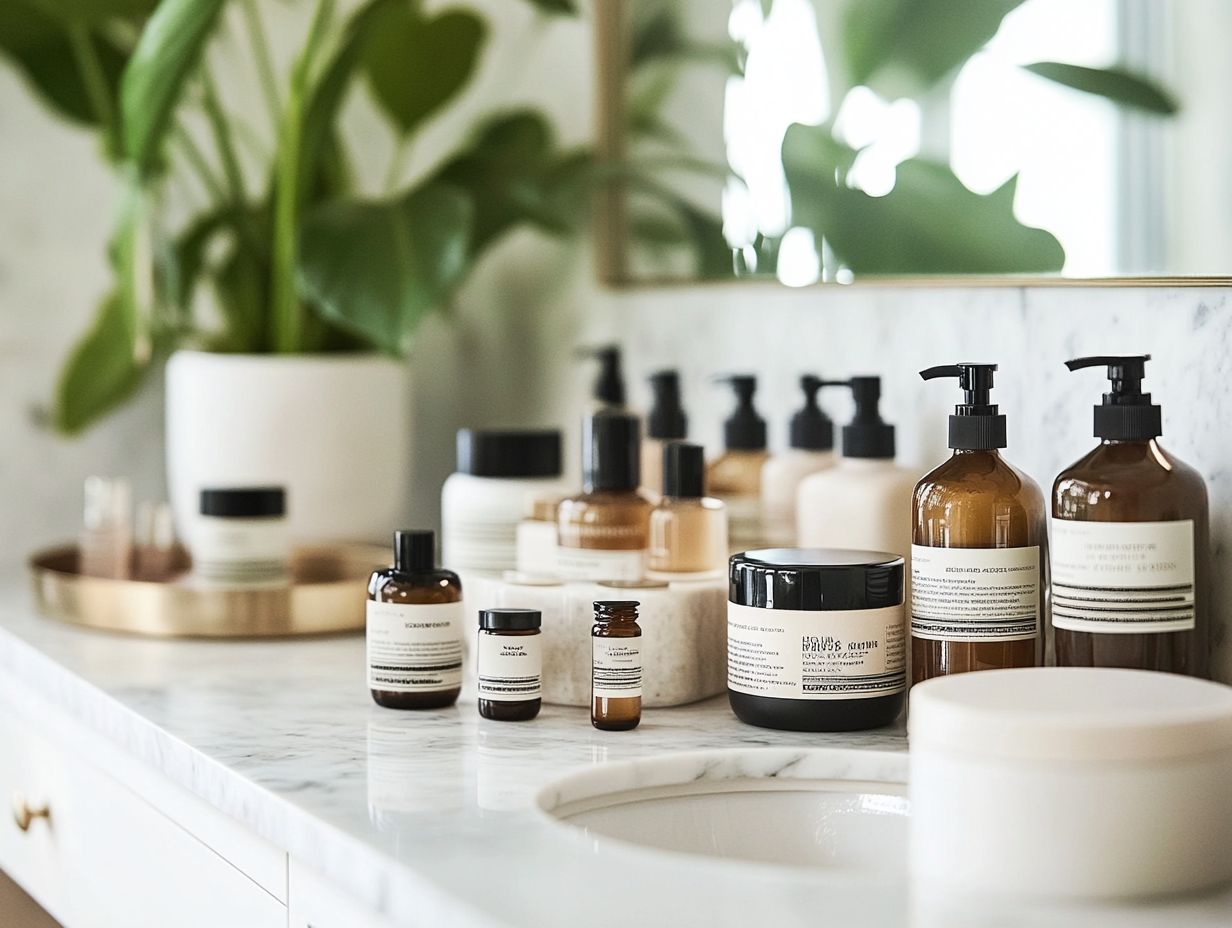
I recognize that getting adequate sleep is essential for maintaining skin health, as it enables the body to repair itself and stimulates blood flow, ultimately promoting a vibrant complexion.
I am aware that insufficient sleep can contribute to accelerated signs of skin aging and worsen existing skin conditions.
The Connection Between Sleep and Skin Health
The connection between sleep and skin health is significant, as adequate rest enhances skin rejuvenation and renewal, facilitating optimal blood flow and nutrient delivery. This process is crucial for maintaining skin elasticity and combating signs of aging.
During sleep, my body engages in essential restorative processes that promote cellular repair, especially during deep sleep stages when growth hormone levels peak. These hormones are vital for tissue growth and repair, directly influencing the vitality and clarity of my skin.
By incorporating practical strategies to improve sleep quality—such as establishing a relaxing nighttime routine, reducing blue light exposure, and creating a comfortable sleep environment—I can greatly benefit my overall skin health.
Adopting a holistic approach that combines skincare with optimal sleep patterns allows me to enhance my skin’s appearance while fostering a deeper sense of well-being.
Tip #9: Consider Professional Treatments
I find that incorporating professional treatments into my skincare routine can significantly enhance its effectiveness and address specific concerns that over-the-counter products may not fully resolve.
Options like chemical peels, microdermabrasion, and laser therapies are effective skin treatments that dermatologists frequently recommend based on individual skin needs.
Types of Professional Skincare Treatments
I understand that there are various professional skincare treatments available, including chemical peels, laser therapies, and microneedling, each designed to address specific skin concerns and promote rejuvenation. These treatments often yield results that surpass what can be accomplished through typical home care.
For example, chemical peels utilize acids to exfoliate the skin, which helps improve texture and reduce pigmentation. In contrast, laser therapies use focused light to treat issues such as acne scars and fine lines, resulting in smoother and more even-toned skin.
Additionally, microneedling involves creating tiny punctures in the skin to stimulate collagen production, enhancing elasticity and minimizing signs of aging.
It is essential for individuals to consult with a skincare professional to identify the most appropriate treatment for their unique concerns. Each method has its own expected outcomes and potential side effects, including redness or tenderness following the procedures.
Tip #10: Listen to Your Skin
Listening to my skin is essential for achieving optimal skin health, as it offers crucial insights into its needs.
By conducting regular self-examinations and being vigilant about changes in texture, hydration, and sensitivity, I can effectively tailor my skincare routine to address my skin’s evolving requirements.
Understanding the Signals Your Skin is Sending
Understanding the signals my skin sends is essential for assessing its health and needs. I recognize that changes in skin sensitivity, hydration levels, or texture can indicate underlying issues that may require adjustments in my skincare routine.
For example, if I notice a sudden increase in dryness or flaking, it may suggest that I need to incorporate a more intensive moisturizer or a gentle exfoliator to effectively remove dead skin cells.
Additionally, I remain vigilant for any unusual spots, moles, or changes in pigmentation, as these may warrant a consultation with a dermatologist.
Persistent redness or irritation is another concern that I take seriously, as it could signal an allergic reaction or inflammation. In such cases, I seek out appropriate soothing products to alleviate the discomfort.
By regularly performing skin self-exams, I can catch potential problems early, allowing for timely intervention and promoting overall skin health.


